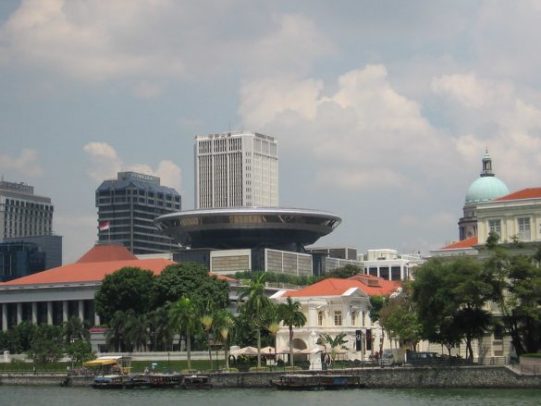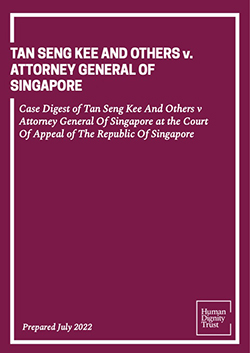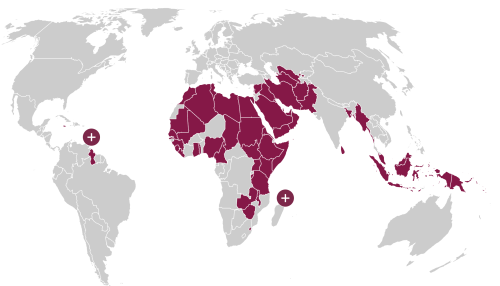The Singapore Court of Appeal has today reinforced a moratorium on the arrest of gay men engaging in consensual, same-sex sexual activity, but has fallen short of removing a discriminatory, criminalising law from the statute books.
Section 377A, which further targeted any form of intimacy between male same-sex couples, was introduced in 1938. Section 377 was ultimately repealed by the Singaporean parliament in 2007, though on the basis that it was up to heterosexual couples what they did in the bedroom. The ‘gross indecency between males’ provision was expressly left in place to ensure gay men were still criminalised.
According to the law, men who commit any act of ‘gross indecency’ with other men can be jailed for up to two years. This also extends to any man who abets, procures or attempts to procure such an act.
In today’s judgment, Tan Seng Kee v Attorney General, the five-judge bench concluded that, ‘[…] the entirety of s 377A is unenforceable unless and until the AG of the day provides clear notice […].’
In 2007, the Singaporean parliament declined to repeal Section 377A, but the Public Prosecutor declared that the law would no longer be enforced. Today’s Court of Appeal ruling formalises this declaration, rather than it being a merely a directive to police.
The wider case, one of only very few human rights cases to be brought in the conservative city state, challenged the constitutionality of Section 377A. Lawyers argued it should be struck down as it violates Articles 9, 12 and 14 of the Constitution, which guarantee respectively personal liberty, equality before the law and freedom of expression. The five-judge bench today dismissed their challenge.
Even though the threat of arrest has been removed and this has been formalised by the Court, in declining to completely strike out the law criminalising same-sex intimacy, gay men in Singapore are still effectively un-apprehended criminals and subject to a culture of shame and homophobia
The Court of Appeal is the apex court in Singapore, meaning the judgment is final and the last chance for LGBT activists and their lawyers to strike down Section 377A through the court system. Hope for reform will now be directed at the country’s parliament.
‘Now that the fight is over in the courts, the Singapore government must now match the great strides made recently in modernising sexual offences legislation by reforming the criminal law that discriminates against LGBT people,’ added Braun. ‘Laws which in 1938 were meant to express society’s views about sex acts between men have no place in a 21st century global financial hub such as Singapore.’
The decision was characterised as disappointing by LGBT activists in Singapore, prompting calls for the legislature to act to remove Section 377A from the penal code.
While this is a small step in the right direction, this simply does not go far enough to provide real protection to the LGBTQ+ community, who continue to be impacted by the cascading effects of Section 377A.
The challenges were mounted by Roy Tan Seng Kee, a retired medical doctor; Johnson Ong Ming, a businessman and international DJ and producer; and Bryan Choong Chee Hoong, the former executive director of LGBT organisation Oogachaga.
In October 2014, the Singapore Court of Appeal declined to remove the country’s anti-gay law from the statute books and held that LGBT people would have to wait for reform of Section 377A to come through Parliament.
Following the historic September 2018 Indian Supreme Court ruling that decriminalised consensual, same-sex sexual activity, and increasing levels of acceptance of LGBT people amongst many Singaporeans, lawyers and activists were motivated to mount a fresh and novel challenge to the discriminatory law.
Notes to Editors
- Watch a video of our Chief Executive, Téa Braun, reacting to the judgment.
- The Human Dignity Trust works with LGBT activists around the world to defend human rights in countries where private consensual sexual activity between people of the same sex is criminalised. With pro bono assistance from the international legal community, we support local organisations that are challenging laws that persecute people on the basis of their sexual orientation and/or gender identity.
- Roy Tan Seng Kee is represented by M Ravi; Johnson Ong Ming by Eugene Thuraisingam, Suang Wijaya and Johannes Hadi; Bryan Choong Chee Hoong by Harpreet Nehal Singh, Remy Choo Zheng Xi, Priscilla Chia, Wong Thai Yong and Jordan Tan.
- Read our case digest of the decision and the full judgment.
- See our online map for information on countries around the world where LGBT people are criminalised.
For more information or to arrange interviews with the Human Dignity Trust’s Chief Executive, Téa Braun (London), contact:
Emma Eastwood, Head of Strategic Communications, HDT
E: emmaeastwood@humandignitytrust.org
Twitter: @HumanDignityT




